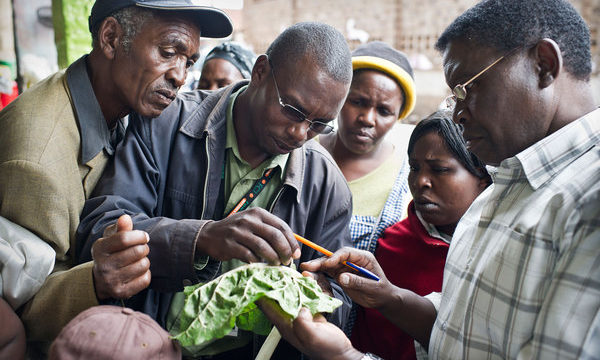
Telémaco Orquera evaluates new tomato varieties for local tolerance to emerging diseases
In 2009 the Government of Santa Cruz, through the Directorate of Agricultural and Food Health (DSA), invited Telémaco Orquera, an agronomist in Mairana, Bolivia, to attend a training course in the city of Santa Cruz. The course, the first of several taught by CABI, introduced Telémaco to plant clinics, which meant setting up a table in a public place, accepting plant samples from members of the community, and giving out written and verbal advice. The plant clinics appealed to Telémaco’s sense of public service.
For three months, Telémaco ran a plant clinic in the municipal market of Mairana, among the crowded stalls, but too many of the patrons were just curiosity seekers, or they were townspeople with a question about their garden plants. Telémaco wanted to be of service to real farmers, so he moved the plant clinic to the Institute (Instituto Técnico Superior, a small, tertiary-level school). When Telémaco received a sample he could not identify, he could send it to Olivia Antezana, at the laboratory in Comarapa.
Community service
The plant clinic at Mairana merges well with both of Telémaco’s jobs, at the DSA and the Institute, which is one reason he has kept it open for so many years. The plant clinic is held in the institute, on Sundays, when the students are there doing their practical work. Students can help at the clinic or bring samples from their relatives who are farmers. The plant clinic gives Telémaco a clear idea of the problems in the area, so he can test solutions in field trials, and then use the results to inform his recommendations in the plant clinic, write fact sheets, and teach farmers in short courses. He has also been selected, together with Juan José Lagrava (DSA), Olivia Antezana (CIAT ) and Ricardo Rodríguez (PROSAT ), to be part of the national team of trainers who implement the Plantwise plant doctor courses.
To keep a plant clinic running, even when one’s employer (the DSA) runs out of money for payroll, one needs to be committed to community service. Running the institute on a symbolic salary is one sign of civic spirt, but good intentions are not enough. To run a plant clinic, it helps to be an expert on local phytosanitary problems. Walking through the tomato patches, Telémaco rapidly identifies the different problems: Alternaria, oidium, bacteria, wiphala (a gemini virus transmitted by whitefly) and tomato borer. Telémaco knows the local names, the scientific binomial, how the problem develops and when it entered the valley. He is disciplined and keeps pictures of the symptoms so that he can link them to the laboratory diagnoses and use them for reference later. In 2015 (through November) the clinic received queries from 24 crops, the most common being tomato, peach and bell pepper.
Local authority
We wondered what the local authorities thought of the plant clinic, so we went to see Pedro Villarroel, the Corregidor, who represents the government of Santa Cruz here in the province of Florida, which includes Mairana. We found don Pedro in the field, weeding his tomatoes alongside a hired worker. For don Pedro, the clinic is essential. In January of 2016, when Telémaco was formally out of work, don Pedro went to Telémaco’s house to ask for advice. This is not just a prerogative of the political elite. Telémaco says that a lot of people bring their problems to him at home. He also attends many farmer queries by phone.

To control the tomato borer, Telémaco explains that the pest is the offspring of a moth. Farmers can control the moth, but not the larva inside the fruit
In January, don Pedro’s problem was a fungal disease, Alternaria, and bacteria. Telémaco recommended a product that don Pedro applied, and the tomatoes recovered. Then on 12 March, don Pedro came to the clinic to tell Telémaco about a problem with the tomato borer, a caterpillar that lives inside the fruit. Telémaco recommended insecticide to control the adult moths. Don Pedro was happy with the results and is glad to have a place to get honest advice for his problems.
Conclusion
It is challenging to run a plant clinic and to identify all of the dozens of problems that farmers can throw down on the clinic’s table. In spite of this, Telémaco continues to run his plant clinic because he is committed to serving his community, because he knows the local plant health problems, and because he has the support of a practical reference lab.
Contributed by Jeffery Bentley, Javier Franco, Sol Danielsen, Yelitza Colmenárez and José Gómez. Photos by Jeffery Bentley and Javier Franco.
Juan José Lagrava and Mauricio Ayarde Flores of the DSA supported this work with logistical help and information. Thanks to the people, mentioned by name in the text, who generously gave us their time to be interviewed.
Related News & Blogs
Clinica de plantas con la participación de jóvenes estudiantes del tecnológico de tarata
En Bolivia, ubicado en el Departamento de Cochabamba, Municipio de Tarata, se encuentra el Instituto Tecnológico Agropecuario Industrial Tarata, ITAIT. Fundado en 1983, dependiente del Ministerio de Educación, provee formación superior no universitaria…
10 February 2020


